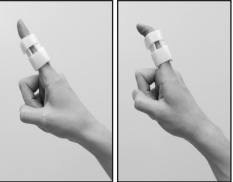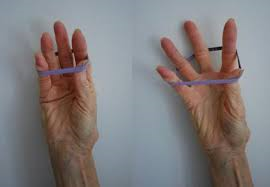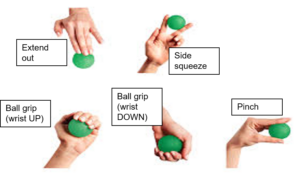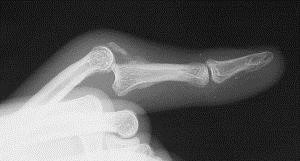This is a type of dislocation of the finger
Healing
This injury can take between 6-12 weeks to heal fully. Smoking will slow down your healing. We would advise that you stop smoking while your injury heals. Talk to your GP or go to www.smokefree.nhs.uk for more information.
Pain and Swelling:
It is normal after an injury to have swelling. Swelling can make your finger stiff and make moving your finger more difficult. In the initial stages it is advised not to leave your hand lower than your heart for long periods as this can encourage swelling into this area.
Painkillers are important to aid your recovery and should be used as required. Stop non-steroidal anti-inflammatory drugs (NSAIDS) e.g. Ibuprofen after 5-7 days as this will slow bone healing. You may find it continues to be a bit achy and swollen for a few months after your injury. An ice pack will help initially with pain and swelling (make sure the ice is not in direct contact with the skin).
Follow up:
A follow-up in the fracture clinic is not usually needed for this injury but you will be referred to our hand therapy team for further care. If you have not heard from the Hand Therapy Team within one week please contact the Virtual Fracture Clinic.
Contact us:
If you are concerned about your symptoms, are unable to follow this rehabilitation plan or notice pain other than in your wrist, please contact the Virtual Fracture Clinic.
Caring for your injury: Splint
Splint/strapping:
A splint is made to place your finger in a fully extended position to protect the injured ligaments keeping the end joint free. This must be worn 24 hours a day for 3-4 weeks. The rest of your hand will be left free for you to use for light activities.
After 3-4 weeks, you will need to continue splinting at night time. A dynamic splint may be issued to you by the hand therapist for use during the day if deemed appropriate. You will be advised by the hand therapist to slowly commence movement after 3-4 weeks.
The aim is to get the finger moving as soon as possible to prevent stiffness. Simple painkillers will help you move the finger.

Caring for your injury: Week by Week
0 – 4 weeks
- √ – You can use your injured hand, but not the injured finger for light tasks with the splint and within the limitations of painX – No heavy lifting tasks and contact sports
4 – 8 weeks
- √ – Strengthening and lifting heavy items can gradually increase using pain as a guide
- X – if you are still experiencing significant pain and swelling, then please contact the Virtual Fracture clinic for advice
- X – Avoid heavy lifting and contact sports for 10-12 weeks
Do Not:
Remove your splint.
Get your hand wet whilst wearing the splint.
Grip anything with your injured finger.
After 4-6 weeks, you should be able to use your finger for light activities and you should be able to return to heavy lifting and gripping and sport after 10-12 weeks.
Caring for your injury: Exercises
Only start these exercises when advised by your Hand Therapist.
Strength
You can do some simple exercises to help increase strength. Practice up to 3 times a day starting with 5 repetitions, increasing to 10 as able.
Use an elastic band around your fingers to strengthen the muscles in the hand.

The following pictures show different ball grip exercises. Start with 5 squeezes for each exercise, holding for a couple of seconds. Rest for 2 minutes before completing a further set. Increase the amount of repetitions for each exercise as able.

Frequently Asked Questions
I’m concerned about my symptoms and/or I am struggling to return to exercise.
Please contact the Virtual Fracture Clinic.
I am struggling with my strapping/splint. What do I do?
Contact the Virtual Fracture Clinic. You will be referred to the hand therapist who will supervise your rehabilitation.
When can I start driving?
You can return to driving when:
- You can move comfortably
- You can control the vehicle safely
Always test your ability to drive in a safe environment first
How can I get a certificate for work?
You can self-certify for the first 7 days following your injury. For any longer periods, please discuss the provision of a fitness to work statement with the Virtual Fracture Clinic Team or your GP.
How do I contact the Virtual Fracture Clinic?
Call 01582 718121. Messages will be checked every morning Monday-Friday.
Email VFC@ldh.nhs.uk

